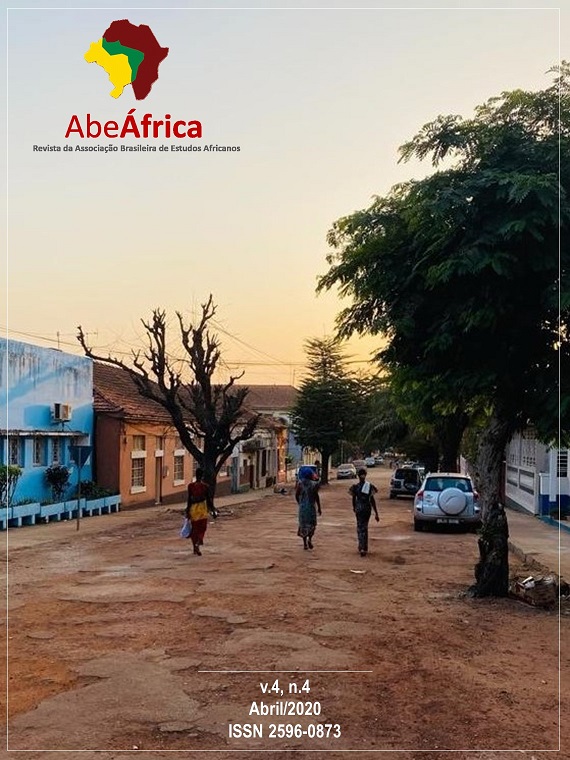Ìkómo e o processo de nomeação dos indivíduos da etnia Yorùbá
Palavras-chave:
Yorùbá, Nomeação, Nascimento, Morte, TradiçõesResumo
Ainda hoje, grande parte dos procedimentos de nomeação de indivíduos de grupos africanos se relaciona a complexos processos culturais que representam sistemas simbólicos, ritualísticos e espirituais. A abordagem proposta nesse artigo tem o intento de estimular reflexão a respeito dessa prática para o povo Yorùbá, grupo étnico presente em diversos países da África Ocidental. Para tanto, serão priorizadas discussões presentes em obras de autores nativos no intuito de compreender suas abordagens, descrições e reflexões a respeito dessa tradição. Serão elucidados conceitos / ideias que orientam o ìkómo no contexto Yorùbá, de modo focar nos entendimentos próprios desse grupo a respeito de sua cultura e a ressaltar suas experiências e vivências no diálogo com e a partir do olhar nativo.
Downloads
Referências
ABÍMBÓLÁ, Kola. Yorùbá Culture: a philosophical account. United Kingdom: Birmingham, 2006.
ADEMULEYA, Babasehinde A. The Concept of Ori in the Traditional Yoruba Visual Representation of Human Figures. In: Nordic Journal of African Studies, nº 2, vol. 16, 2007, p. 212–220.
ADÉÉKÓ, Adélékè. Oral Poetry and Hegemony: Yorùbá Oríkì. In: Dialectical Anthropology, nos 3-4, vol. 26, set. 2001, p. 181-192.
ADEGBINDIN, Omotade H. Ifa in Yoruba Thought System. Durham: Carolina Academic Press, 2014.
AKINRULI, Samuel A.; AKINRULI, Luana C.M.C. Descolonizando práticas e saberes: um exercício de reflexão sobre os estudos culturais na África Ocidental: o caso da Nigéria e do povo Yorùbá. In: SANTOS, Vanicléia S.; MARCUSSI, Alexandre A; AMADO, Leopoldo; RESENDE, Taciana A. Ga. de. (Org.). Cultura, História Intelectual e Patrimônio na África Ocidental (séculos XV-XIX). Curitiba: Brasil Publishing, 2019, p. 67-94.
AKINRULI, Samuel A.; AKINRULI, Luana C.M.C. Entre língua e cultura de um grupo étnico: o ensino de Yorúbà em uma experiência de ensino, pesquisa e extensão. In: Anais do III CIM – Congresso de Inovação e Metodologias no Ensino Superior. Belo Horizonte: Diretoria de Inovação e Metodologias de Ensino (Giz/UFMG), p.1-10, 2017. Disponível em: https://congressos.ufmg.br/index.php/congressogiz/CIM/paper/download/598/315, acesso em 2 de dezembro de 2019.
AKINNASO, F. Niyi. The Sociolinguistic Basis of Yoruba Personal Names. In: Anthropological Linguistics, nº 7, vol. 22, 1980, p. 275–304.
ARKER, Clare. “Redreaming the World”: ontological difference and abiku perception in The Famished Road. In: Postcolonial Fiction and Disability: exceptional children, metaphor and materiality. Ney York: Palgrave Macmillan, 2011, p.158-188.
BALOGUN, Babalola J. An Examination of the Yoruba Traditional – Existentialist Conception of Evil. In: Thought and Practice: a Journal of the Philosophical Association of Kenya (PAK) – New Series, nº 2, vol. 6, dez. 2014, p. 55-73.
BARKER, Clare. “Redreaming the World”: ontological difference and abiku perception in The Famished Road. In: Postcolonial Fiction and Disability: exceptional children, metaphor and materiality. Ney York: Palgrave Macmillan, 2011, p.158-188.
DREWAL, Margaret T. Yoruba Ritual: performers, play, agency. Bloomington: Indiana University Press, 1992.
JOHNSON, Samuel (Rev.) & JOHNSON, Obadiah (Dr.). The History of The Yorubas. Lagos: CSS Limited, 2001. [1921]
Ifa of the Yoruba People of Nigeria. Disponível em http://www.unesco.org/archives/multimedia/?pg=33&s=films_details&id=3742, acessado em 10 de dezembro de 2019.
ÌKỌ̀TÚN, Reuben O. Surnames as Markers of Identity among the Yorùbá Sub-Ethnic Group Members. In: Open Journal of Modern Linguistics, 2014, nº 4, jun. 2014, p. 307-316.
MOBOLADE, Timothy. The Concept of Abiku. In: African Arts, nº 1, vol. 7, out. 1973, p. 62-64.
ODEBODE, Idowu; ONADIPE, Adenike. A speech act analysis of Abiku names among the Yoruba Nigerians. In: Language in India, nº 5, vol. 12, mai. 2012, p. 129-142.
OGUNWALE, Joshua A. A Pragmalinguistic Study of Yoruba Personal Names. In: Journal of Literary Onomastics, nº 01, vol. 2, 2012, p. 24-35.
OKEWANDE, Oluwole T. Etymological investigation of tones in the Yorùbá personal praise names: Oríkì Àbíso. In: International Journal of Humanities and Cultural Studies, vol. 2, nº 1, jun. 2015, p. 486-494.
OLAJUBU, Oyeronke. Women in the Yoruba religious sphere. Albany: State University of New York Press, 2003.
OLÚFÉMI, Táíwò. Ifá: An Account of a Divination System and Some Concluding Epistemological Questions. In: WIREDU, Kwasi (ed.). Companion to African Philosophy. New Jersey: Blackwell Publishing, 2004, p. 304-312.
OLÚWOLÉ, Sophie B. Culture, Gender, and Development Theories in Africa. In: Africa Development, vol. XXII, nº 1, 1997, p. 95-121.
OLÚWOLÉ, Sophie B. Socrates and Òrúnmìlà: Two Patron Saints of Classical Philosophy. 3ª ed. Lagos: Ark Publishers, 2017.
ONIBERE, S.G.A.; ADOGBO, Michael P. (eds). Selected Themes in The Study of Religions in Nigeria. Lagos: Malthouse Press Limited, 2010.
OYÈWÙMÍ, Oyèrónké. Conceptualizing Gender: The Eurocentric Foundations of Feminist Concepts and the challenge of African Epistemologies. In: African Gender Scholarship: Concepts, Methodologies and Paradigms. CODESRIA Gender Series – Volume 1. Dakar: CODESRIA, 2004, p. 1-8.
OYÈWÚMI, Oyèronké. Family Bonds – Conceptual Binds: African Notes on Feminist Epistemologies. In: Signs, nº 4, vol. 25, verão de 2000, p. 1093-1098.
SOCIETY, Church Missionary. A dictionary of the Yoruba language. Lagos: Church Missionary Society Bookshop, 1918.
TRAGER, Lillian (Abeke). Yoruba Hometowns: community, identity, and development in Nigeria. London: Lynne Rienner Publishers, 2001.
Downloads
Publicado
Edição
Seção
Licença
São automaticamente cedidos à Revista os direitos autorais sobre originais e traduções nela publicados. Os dados e conceitos abordados são da exclusiva responsabilidade do autor.

